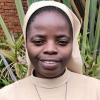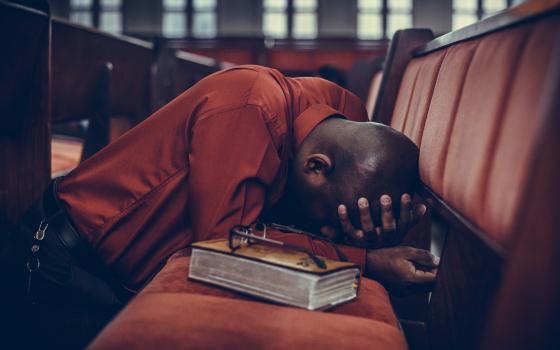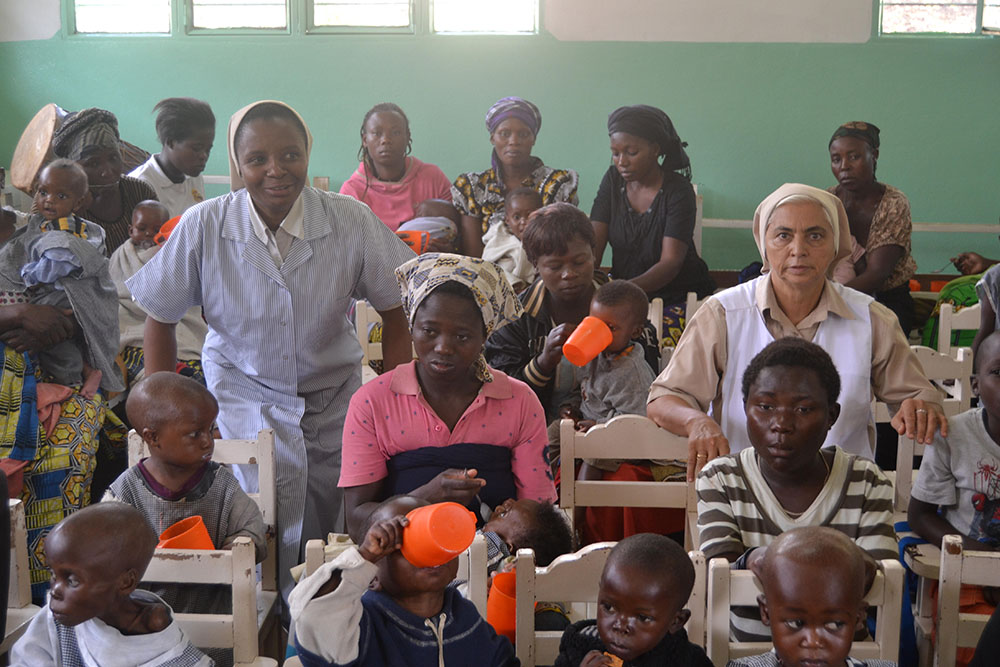
Daughters of the Resurrection in the waiting room of one of their clinics in the Democratic Republic of Congo (Courtesy of Rose Namulisa Balaluka)
Bukavu, the capital of South-Kivu province, lies in the east corner of the Democratic Republic of Congo, bordering Rwanda. We have been plagued by insecurity since 1996, particularly following the Rwandan genocide. Three of our sisters were killed by the Alliance of Democratic Forces for Liberation of Congo in 1998, and another was abducted in 2017.
Massive displacement of populations and alarming emergence of disease, poverty, malnutrition and starvation continue for most families. Sexual violence is rampant and abandonment of families by fathers is common, leaving women particularly vulnerable.
These human-made problems are only worsened by those of nature, as this region of Congo is prone to volcanic eruptions and earthquakes that send people running for their lives.
When COVID-19 arrived, the blanket of insecurity and fear increased as it now had a new face. People were traumatized as family members began to die, for apparently no reason. They still feel that if someone tests positive, life has just come to an end. Bantu people love life and so have a strong desire for it, the longer the better!
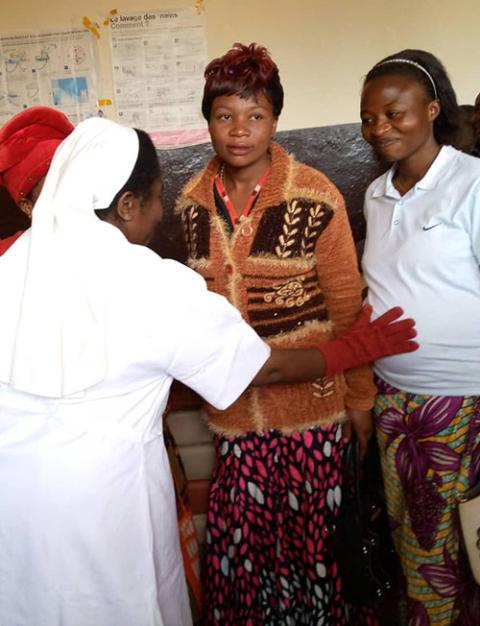
A sister cares for pregnant women at a clinic in Congo. (Courtesy of Rose Namulisa Balaluka)
Our local congregation, the Daughters of the Resurrection, founded in 1966, had developed many health centers in South-Kivu province, but continuing insecurity and COVID-19 closed them down. Now, we have only two centers operating, but with extremely limited resources. The government offers no assistance to us, so it is up to us to find ways to finance all we do.
We lack electricity or generators that would allow us to perform preclinical and biochemical examinations, X-rays or scanning. We have too few beds or even latrines for the numbers of patients, and our protocols for water, sanitation and hygiene are also limited.
Our focus is women's health, as this was the intent of our foundress. We do our best to offer ante- and post-natal care for pregnant women, and delivery services, including cesarean birthing, but our operating rooms are not properly equipped. We deliver up to 12 babies in a day.
Women, in general, are very vulnerable in this region. Rape is common, as is domestic violence, even against very young women. Girls are led into prostitution to help alleviate family poverty, as there are few ways to earn money. Women are frequently abandoned, leaving them as sole providers of their families.
These conditions have led us to offer marriage and trauma counseling, including instruction for wedding rite preparation. It is our hope we can help prevent broken marriages.
Limited resources of finance and personnel and common concern for maternity care motivated us to work in collaboration with two congregations that also have health centers in this region: Sisters of St. Dorothy of Cemmo and Sisters of Mary Queen of Apostles from Bukavu. We share supplies and equipment and programs to educate the populations on prevention of diarrhea and diabetes. We also teach hygiene and COVID-19 prevention and refer patients to one another's facilities.
All three communities have nutrition centers in which we assist families and children in addressing malnutrition, which is rampant. The constant insecurity prevents families from farming and storing food.
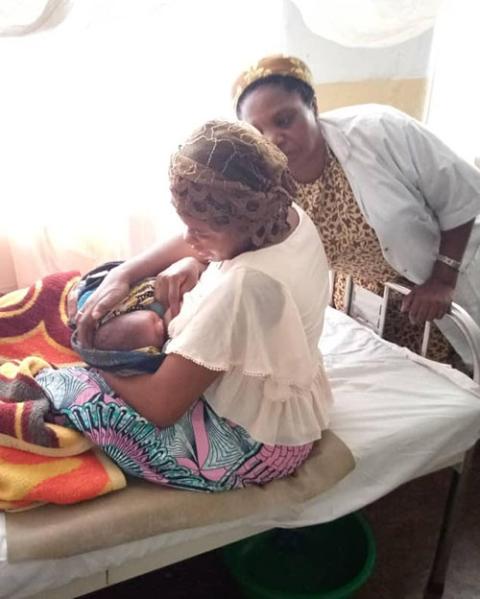
A nurse in a Daughters of the Resurrection clinic assists a new mother with breastfeeding her infant. (Courtesy of Rose Namulisa Balaluka)
To fight malnutrition, we first treat those already suffering from it by giving them nutritional supplements, antibiotics, and antimalarial and dewormer drugs. For pregnant and breastfeeding women, we offer additional food with sosoma (bone) broth.
Then as preventative strategies, we try to sensitize the population, teach them self-management in best food practices, and show them the importance of growing vegetables, doing small farming and raising livestock. Since most of the malnourished people come from poor families, we teach them some business practices so they can begin some revenue-generating activities for family autonomy.
This collaboration among our three congregations attracted the attention of a nongovernmental organization, Medicines for Humanity, from the United States, with an office in Cameroon. It has been assisting us now for some months, as its focus is also maternal and child health. It has helped us with equipment, educational COVID-19 materials and protective gear.
Although we keep trying to educate the population on the value of scientific methods that bring real results and well-being, encouraging childhood vaccinations, deworming and providing nutrition supplements, it is challenging, as we are confronted daily with the dangers of traditional healing methods.
The people turn to these because of ignorance and the high cost of modern medicine throughout the country. These alternatives are often in the hands of traditional, religious charlatans who set up pharmacies for consultations and unsafe drugs.
Their methods of healing often depend on witchcraft and sorcery. Prophet-healers promise healing by combining African medical traditions and Christian prayers and Bible readings. They preach mystical ideas and beliefs to discourage the use of modern health care methods, to get money for their services.
Advertisement
Diseases that people cannot explain are blamed on "child sorcerers." These children, sometimes selected by the church "preachers" or even schoolteachers, are diagnosed as a witch, and their families are required to pay money to have them exorcised or even killed. At other times, the children, once identified in this way, both girls and boys, are just abandoned and become street children, surviving on their own.
Some of the high national medical costs result from neglect by our national leaders. Government hospitals and health centers lack equipment, medicines and even water for treatment and care. Working conditions for nurses and doctors in these facilities are deplorable. Even though civil law requires that staff be paid fairly, salaries are extremely low or not paid at all.
Patients pay the price for these conditions, and are often held like prisoners in the hospital for weeks and months even after recovery, unable to pay their bills.
We, as sisters, are committed to serving our people to the best of our ability. I don't think our situation here is very different from what other sisters experience in other areas of Congo. Our hearts remain faithful to our charism and mission of care for families since 1966, when we were founded by Mother Hadewych to help the people — particularly the women — suffering the effects of the war of Mulele, an uprising that was part of the Congolese movement for independence.
Her own congregation was reluctant to do this work, so she sought permission from the bishop and began recruiting young women of the area, forming them into a religious community to serve those suffering families of Bukavu. Our spirituality of love of Christ in his passion, death and resurrection strengthens us to give hope to the suffering among us.
